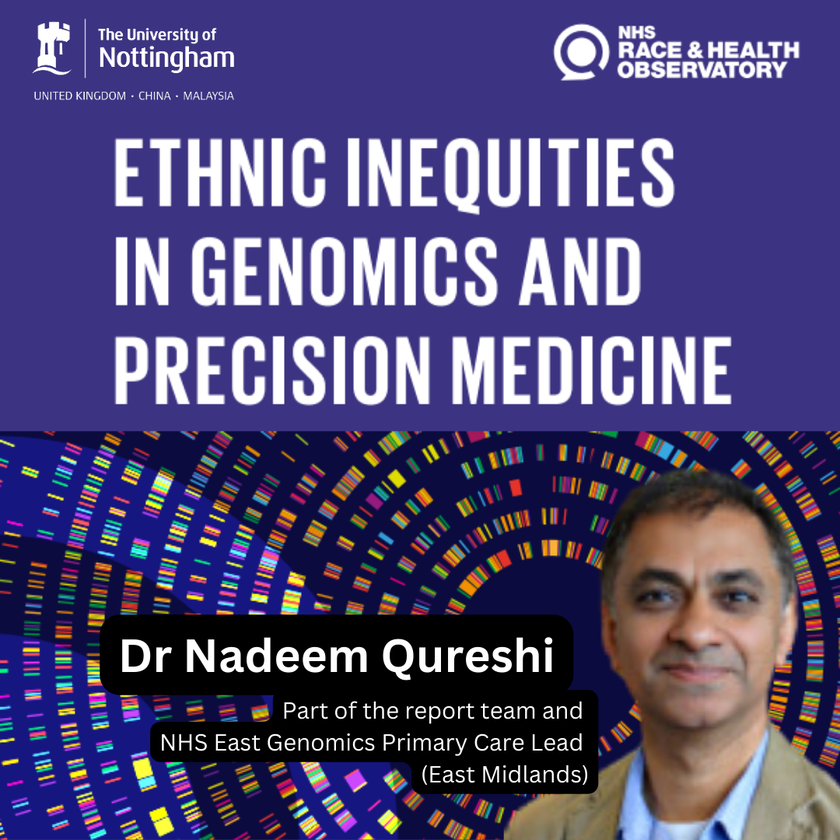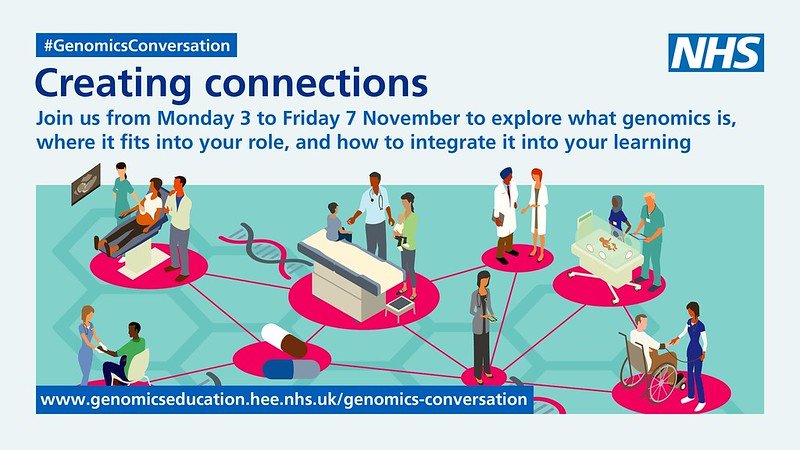A strategic partnership with the NHS North Thames Genomic Medicine Service (NT GMS) designed to ensure better access, understanding and information to genomic medicine and research has been announced by the NHS Race and Health Observatory.
The announcement comes on the third day of national Genomics Conversation Week, which focusses on 'creating connections with patients'.
To tackle the underrepresentation of global majority populations in genomics, a new digital platform, the North Thames Genomics Health Hub, will be co-produced with local communities to bridge the gap between genomic medicine and the public.
The Hub will provide accessible, culturally-tailored information and facilitate peer-to-peer support connections to bring awareness to the benefits of genomic medicine and research. By combining trusted resources with shared lived experience, the initiative is designed to build trust, spark meaningful conversations, and empower individuals to engage with their health, and explore co-produced approaches to reduce health inequalities.
For people living in North London, Hertfordshire and Mid and South Essex, the NT GMS serves as one of seven regional NHS services established to improve access to genomic testing and innovation in routine care.
The Observatory and NTGMS will work collaboratively with communities and stakeholders to co-create and co-develop engagement strategies, evidence-based approaches, communications, resources and information sites for signposting as part of the online platform launch.
Jono Organ, NT GMS Patient, People and Carer Panel Co-chair, North Thames Genomic Medicine Service said: “The Genomic Health Hub (GHH) is more than an initiative, it’s a movement and a promise. As Co-Chair of the NT GMS panel and as a patient, I’ve felt the power of being seen and heard in a system that too often overlooks lived experience.
The GHH is where science meets humanity, where survivors become strategists, and where equity, visibility, and community leadership shape the future of genomic healthcare. It’s a space where disparities are challenged, stories drive systemic change, and every voice helps build a more just and inclusive health landscape
Jono Organ, NT GMS Patient, People and Carer Panel Co-chair, North Thames Genomic Medicine Service
Last year, the Observatory published (opens in a new tab) its report ‘Ethnic Inequities in Genomics and Precision Medicine’, which called for the development of broad resources designed to engage, inform and empower diverse communities on the benefits, role and function of genomics in health.
One key report recommendation (opens in a new tab) included the development of accessible spaces and platforms to bring together communities and deliver tailored communication to inform underserved population groups, reducing barriers to accessing support and participating in research opportunities. This project represents a direct response to this key recommendation, and its findings could be replicated nationally.
The new agreement marks a significant step towards action, ensuring that communities regardless of ethnicity or background—can benefit from the rapidly advancing field of genomic medicine and research.

This unique partnership with North Thames Genomic Medicine Service will support the development and dissemination of inclusive, community-centred genomic healthcare solutions. It’s a fantastic opportunity to combine the strengths and expertise of both our organisations and reflects our shared commitment in dismantling systemic barriers in healthcare, enabling more inclusive participation in genomic innovation and tackling long-standing inequalities
Professor Habib Naqvi, chief executive, NHS Race and Health Observatory
Prof Naqvi continues: “We are pleased that this direction of work also aligns with government plans to shift to a neighbourhood health model, empowering communities, the NHS and statutory services to work together on improving the health and wellbeing of all communities.”
The project is scheduled for completion in early 2026.
Professor Dame Sue Hill, Chief Scientific Officer for NHS England and Senior Responsible Officer for NHS Genomics, said: “Genomics is revolutionising the way we predict, prevent, diagnose and treat illness – whether it’s enabling faster diagnoses for children with rare conditions, to personalising cancer care and identifying those at higher risk of common conditions.
"No community should be left behind as genomic medicine transforms healthcare and this initiative will tackle inequalities head-on, building trust and ensuring everyone benefit from the opportunities that genomics offers.
"The North Thames Genomics Health Hub marks a crucial step towards this endeavour, reinforcing our commitment to ensuring patients receive the most personalised and effective care possible."
Genomic medicine has the potential to transform healthcare, but only if it is accessible, inclusive, and equitable. This partnership with the North Thames Genomic Medicine Service represents a vital step in making sure that diverse communities are not left behind in the genomic era. Through the Genomics Health Hub, we are creating a trusted space for dialogue, learning, and collaboration, bridging the gap between cutting-edge science and the lived experiences of the people we serve.
Dr Veline L’Esperance, Senior Clinical Advisor, NHS Race and Health Observatory
The NTGMS is the NHS genetic testing provider for seven million Londoners; one of the most ethnically diverse populations across England, where English is not the main language for 24% (opens in a new tab) of the population, and with high levels of highest deprivation (opens in a new tab)
Despite the transformative potential of genomics and precision medicine, persistent disparities in access to genomic medicine and research, disproportionately disadvantage non-European, non-English speaking, and underserved population groups. This disparity results in a lack of trust, missed diagnoses, misdiagnoses and poorer health outcomes.
Dr Shazia Mahamdallie, Health Equity Lead, North Thames Genomic Medicine Service (NT GMS) said:
"Genomic medicine has the power to help us all live healthier lives through improved diagnostics, personalised treatments and disease prevention. However, a lack of awareness and tailored information can prevent advances in genomics from reaching everyone.
Across the NT GMS, we are working to ensure that genomic testing within the NHS closes health gaps rather than widens them. That is why we are putting our diverse communities at the very heart of the new North Thames Genomics Health Hub. We are being led by evidence and are bringing local people’s voices directly into the Hub's design and content and, through this collaboration, we aim to build the trust needed to tackle historical underrepresentation."


